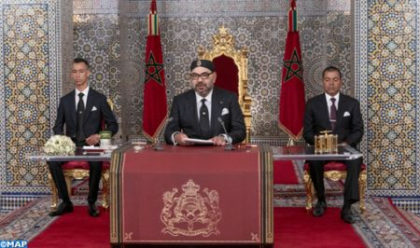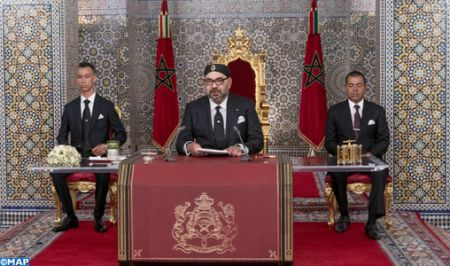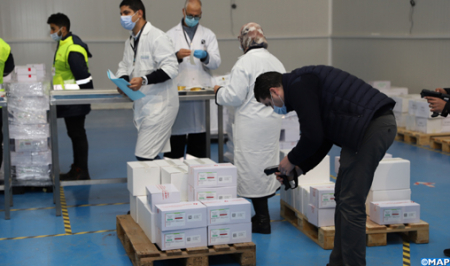 King Mohammed VI announced Monday the setting up by next fall of an ad-hoc committee for the development model that will make proposals and suggestions on how to improve the development reforms and increase their effectiveness.
King Mohammed VI announced Monday the setting up by next fall of an ad-hoc committee for the development model that will make proposals and suggestions on how to improve the development reforms and increase their effectiveness.
In a speech he delivered Monday evening on Throne Day, marking this year the 20th anniversary of his enthronement, King Mohammed VI acknowledged that “in recent years, our development model has proven to be inadequate in terms of helping us meet the growing needs of a segment of the population, reduce social inequalities and tackle regional disparities.”
He said the decision to set up the committee was dictated by his keenness to add a new building block to the country’s development agenda, as part of a continuing process, and to revisit and update that model.
The committee “will have to take into consideration the major reforms introduced – as well as those to come – in a number of sectors, such as education, health, agriculture, investment and taxation,” the Monarch said, adding this advisory body is expected to make suggestions on how to improve these reforms and increase their effectiveness.
The committee is also expected to be totally impartial and objective, and to report on facts as they are on the ground, however harsh or painful they may be. “And when proposing solutions, I want it (the committee) to be daring and innovative.”
“Most importantly, we must be resolute and audacious and show a keen spirit of responsibility as we implement the relevant conclusions and recommendations adopted, no matter how hard or costly that may be,” the King stated further.
The Monarch made it clear that what undermines the positive results of previous reforms is that the effects of the progress and the achievements made have not, unfortunately, been felt by all segments of the Moroccan society.
“Indeed, some citizens may not directly feel their positive impact on their living conditions, or in terms of helping them meet their daily needs, especially in the areas of basic social services, the reduction of social disparities and the consolidation of the middle class,” the King said, avowing that he suffers personally when a fraction of the Moroccan people – even if it were just one per cent of the Moroccan population – endures hardships and lives in poverty. “There will be no peace of mind for me so long as we have not properly tackled the hurdles faced and found the right solutions to development and social issues.”
Reiterating the particular importance he attaches to human development programs, social policies and the need to respond to Moroccans’ pressing concerns, the King acknowledged that this, however, cannot be achieved without a comprehensive vision, without qualified human resources or without meeting the conditions required to carry out planned projects.
As regards the Committee’s membership, the King said he has seen to it that the committee includes representatives from various fields of knowledge and intellectual currents, including prominent Moroccans from the public and the private sectors who meet the requirements of competence and impartiality, who are able to feel the pulse of society, who understand its expectations and who have the nation’s best interests at heart.
King Mohammed VI also made it clear that the committee will not serve as a second government or be a parallel official institution. “This is an advisory body with a specific time-bound mission.”
“Morocco belongs to all Moroccans. It is our common home. We must, all of us, each in his or her respective field of competence, contribute to building our nation, ensuring its development and preserving its unity, security and stability,” The Monarch underlined, adding “We want a country that accommodates all its sons and daughters; a country in which all citizens – without exception – enjoy the same rights and have the same obligations, in an environment where freedom and human dignity prevail.”



